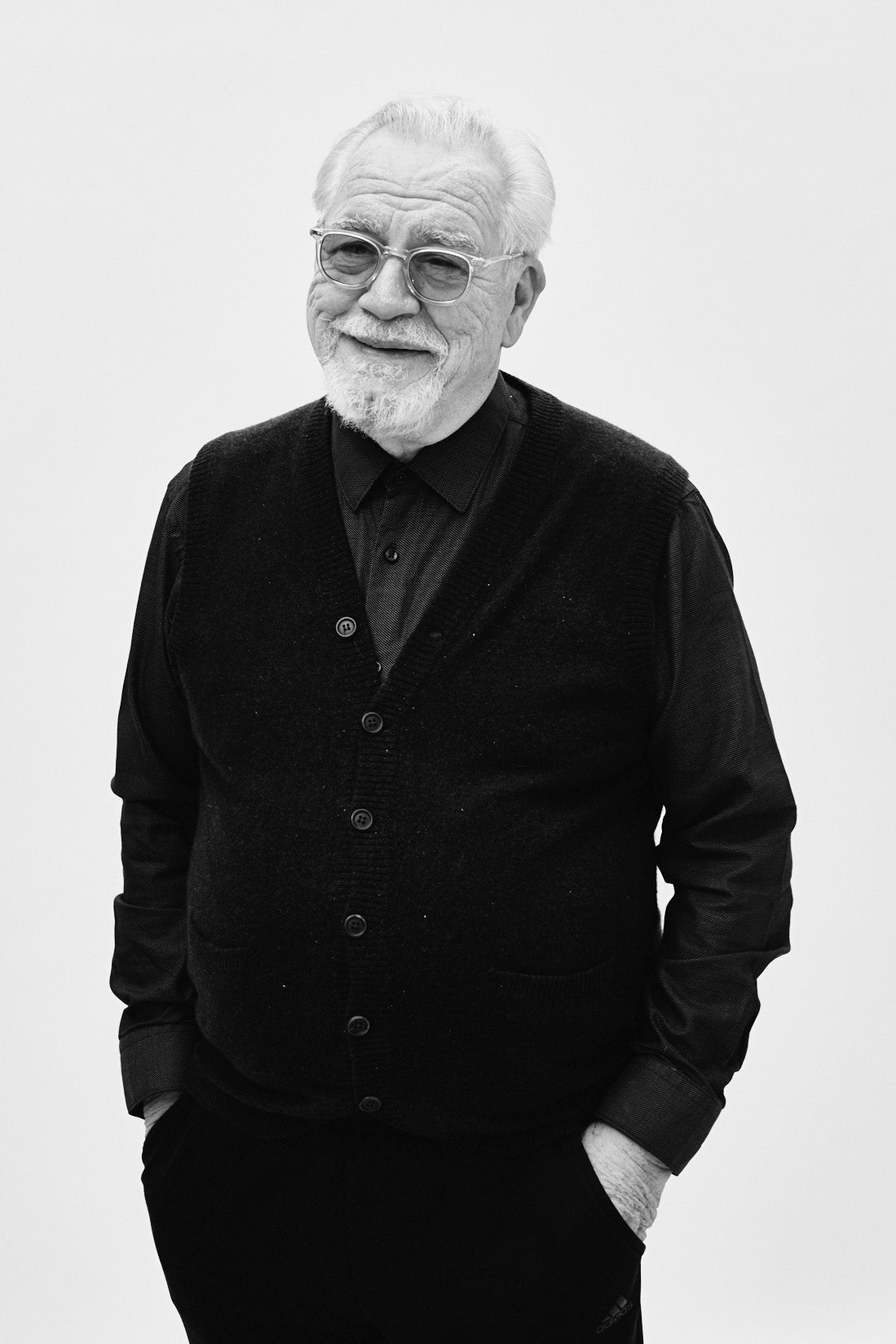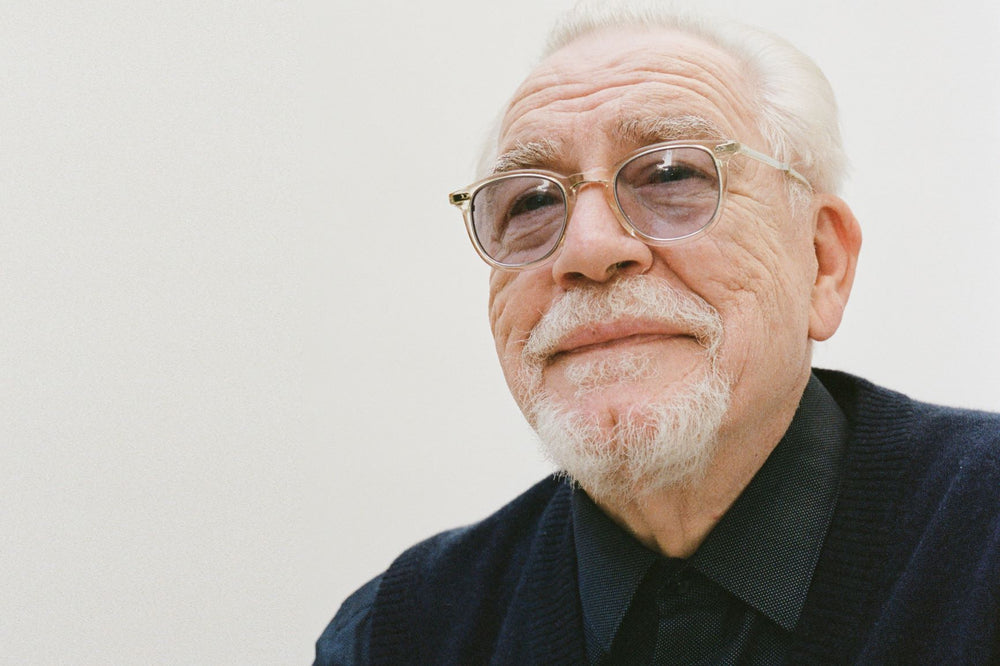Scotland-born Brian Cox has been in the acting game for nearly 60 years, which makes him an O.G. of epic proportions. But his most recent role at 73 – as media magnate Logan Roy on the HBO hit Succession – may be his most influential to date. We caught up with Cox in a quiet corner of the Peninsula Hotel in Beverly Hills, a day after he accepted a Golden Globe for his performance as Roy. He was tired, but still sharp, funny as hell, and full of stories. He was also sporting a super sleek pair of custom dyed Mr. Leight sunglasses.


GLCO: Dig the purple Mr. Leight Coopers…especially with the tux the other night.
BC: You know, I like the tint of these. I used to wear a lot of Oliver Peoples, and I was excited to learn these came from the founder’s son. It’s funny, because I usually wear reading glasses for seeing up close, and couldn’t see very well on the night of the awards. People would be walking towards me in the hall, and say “Hey Brian,” and I’d not know who the hell they were.
GLCO: But you were going for style points?
BC: Phoebe Waller-Bridge said I had to wear them.


GLCO: How’d you originally get into drama?
BC: I was 15. I left school. My education was a disaster. I walked down to the theatre in Dundee, my hometown, to apply for a job. Verdi’s Triumphal March from Aida was playing, and they asked me if I liked classical music. I lied to them of course. I said ‘Oh yeah, fantastic.’
GLCO: I bet you met some characters in those early days.
BC: I almost got punched in the face coming through the door that first evening. Two guys – the stage manager and an actor – were swinging at each other in a drunken brawl. After it was over, one of them lit up a cigarette, and asked the other: “Are you alright Darling?” I knew it was the place for me.


GLCO: You were with the Royal Shakespeare Company for years. What was your best performance?
BC: Titus Andronicus in 1988 really launched me. It’s a part a lot of people had done and failed. I was given a bunch of directors to think about working with – all of whom didn’t want to do Titus, because they were intimidated by it. I thought it was a bit cowardly. I knew of a young visionary named Deborah Warner working with the Kick Company in Ireland who we thought would be good. But she had just lost her funding, and was about to leave the UK. Luckily, we were able to get her, and it was a big success. Then I played King Lear at the National Theatre in 1990, but I always wanted to do movies.


GLCO: What was your first experience with Hollywood?
BC: Well I’d been here in the seventies. I had some friends who lived over here. But the first time I came to Hollywood to look for work as an actor was in 1995. I was set to meet with John Schlesinger who was in the middle of editing Marathon Man. I was summoned to go to Paramount, and I thought ‘Oh, my moment has come,’ and then Schlesinger says ‘Well, we were actually thinking of you for a role of Julius Caesar in a production back in London.’
GLCO: They kept trying to drag you back.
BC: I thought that was funny.
GLCO: Now you’re winning a Golden Globe twenty-five years later.
BC: [Succession’s producer Jesse Armstrong] told me this role of Logan Roy would only be for a season, but then it ended up going longer. I’m grateful. Once in a while a role comes along where you think, ‘Yes, this is exactly where I need to be right now.’


GLCO: You’ve played a lot of bad-asses on screen. I was on the phone with Garrett earlier and he was like ‘I wonder if Brian is going to be anything like Logan Roy’ and frankly I thought the same thing myself.
BC: [Laughs] maybe a much more tired version of him. I’m not nearly as contemptuous. All human beings are rife with flaws.
GLCO: You’ve mentored a lot of young actors. It must be confusing for them these days with so many potential avenues to go down.
BC: There’s a lot of choice. And I think choice can be confusing. I think you have to be very careful and not get sidetracked from what you want to do. My thing was to keep them on the straight and narrow, not get distracted into something they’d later regret, because you’re very vulnerable in that stage. I set up these counseling sessions for new actors who were coming out of school and going into the casting process, which can be so humiliating. I enjoyed working with younger actors, but it took a lot out of me.


GLCO: Maybe a few weeks out here will rejuvenate you.
BC: I lived here! The reason why I left LA is I ran out of farmer’s markets.
GLCO: [Laughs.]
BC: As my mother used to say, ‘LA isn’t a bad place, it’s just [in a Scottish brogue] “No real.’”
GLCO: Probably fair. When you come back to California is there anything you miss and just have to do?
BC: I like TreePeople. And I love Mulholland. I lived in Laurel Canyon for a while before I bought a house in Sherman Oaks—bad decision. LA is weird because there are certain areas where you’ve got a bit of the old hippie stuff, and it feels like a community, like Laurel, and then you can move a few miles and end up in pure Suburbia and you go ‘Oh fuck.’ But on the whole, I didn’t mind LA. I loved the weather. My wife loved the weather. But I spend a bit of time in the UK, so getting back and forth is hard. We spend a lot of time in the Berkshires, in Massachusetts, which is like LA, because you can do your marijuana shopping there.
GLCO: That’s important I guess.
BC: You guess? What’s the place everyone goes here? Med Men? [Yawns.]

